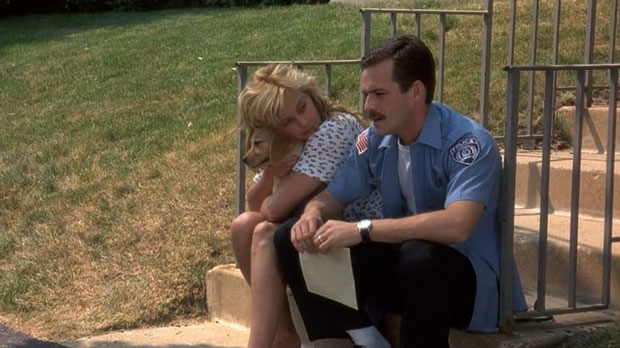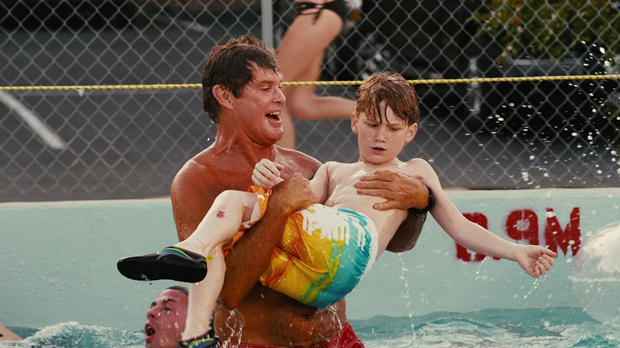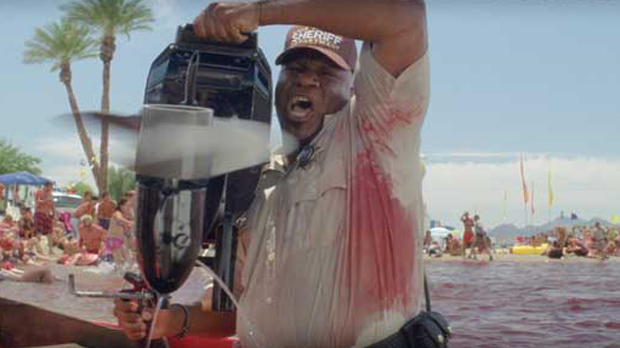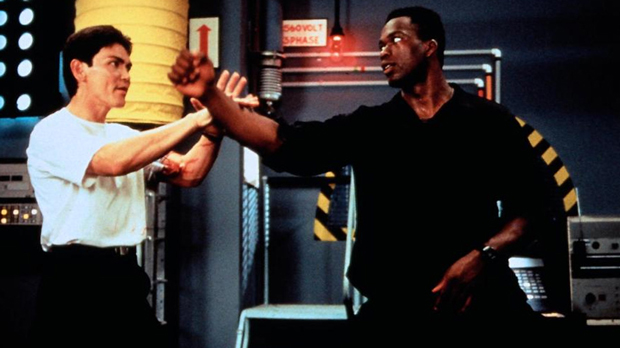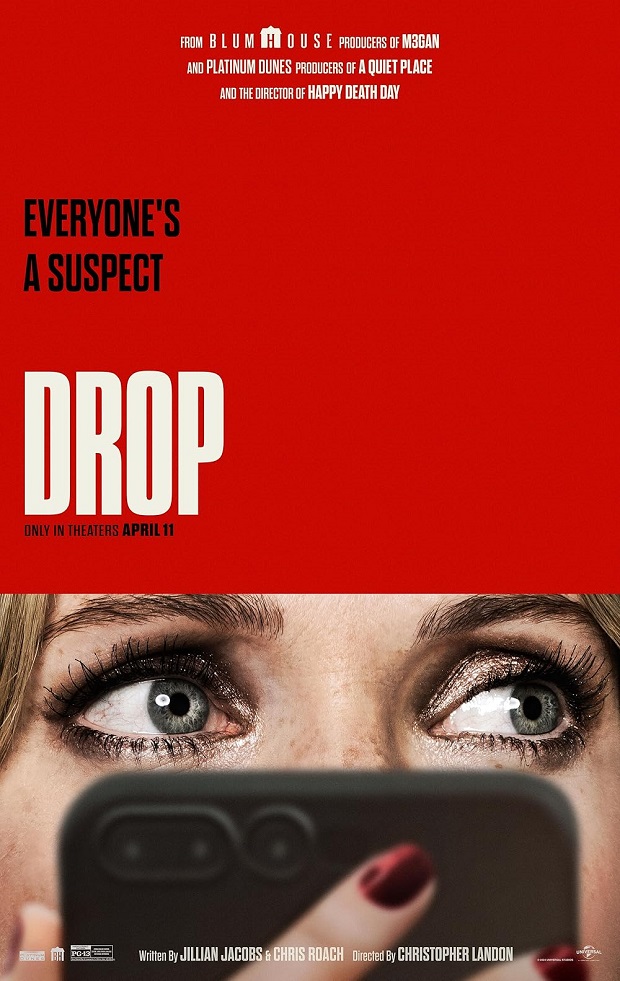 Normal Life (1996) Fine Line/Drama RT: 102 minutes Rated R (scenes of violence, self-destructive behavior, sexuality, nudity, drug and alcohol use, language) Director: John McNaughton Screenplay: Peg Haller and Bob Schneider Music: Robert McNaughton and Ken Hale Cinematography: Jean de Segonzac Release date: October 25, 1996 (US) Cast: Luke Perry, Ashley Judd, Bruce A. Young, Jim True, Penelope Milford, Edmund Wyson, Kate Walsh, Tom Towles, Michael Skewes, Scott Cummins, Kevin Mukherji. Box Office: $22,891 (US)
Normal Life (1996) Fine Line/Drama RT: 102 minutes Rated R (scenes of violence, self-destructive behavior, sexuality, nudity, drug and alcohol use, language) Director: John McNaughton Screenplay: Peg Haller and Bob Schneider Music: Robert McNaughton and Ken Hale Cinematography: Jean de Segonzac Release date: October 25, 1996 (US) Cast: Luke Perry, Ashley Judd, Bruce A. Young, Jim True, Penelope Milford, Edmund Wyson, Kate Walsh, Tom Towles, Michael Skewes, Scott Cummins, Kevin Mukherji. Box Office: $22,891 (US)
Rating: *** ½
One of the biggest cinematic injustices of the 90s was Fine Line’s decision not to release the crime drama Normal Life theatrically, the result of a dispute with director John McNaughton (Henry: Portrait of a Serial Killer). It premiered on HBO instead, a move that usually indicates the movie in question wasn’t deemed worthy of a theatrical release by its parent studio. Selling it off to cable stings a lot less than spending millions on marketing a movie only to see it go ignored by the public.
The problem is that movies that premiere on cable tend to be overlooked by serious film fans. It’s likely that Normal Life would have slipped into obscurity had it not been for all the good notices it received from critics. I don’t know how it would have fared at theaters if widely released; I can only say that I think it’s a great film.
Although Normal Life is characterized as a crime drama, I prefer to think of it as a doomed love story about two people who shouldn’t be together. We’ve probably all known somebody that gets involved in a relationship with somebody with deep psychological problems who ultimately alienates everybody with his/her erratic or irrational behavior. Such relationships are consuming. We can only stand by and watch helplessly as our friend, relative, co-worker or whoever loses him/herself in this person. Sometimes our friend comes to his/her senses and gets out it. Other times, they don’t and the consequences are dire. Normal Life, loosely based on a real-life case, is definitely a worst case scenario.
Chris (the late Perry in his finest performance) is basically a decent person. He’s a cop in the western suburbs of Chicago, a place defined by shopping centers, fast food restaurants and non-descript houses. He doesn’t get on with his fellow officers because of his perceived arrogance. Pam (Judd, Ruby in Paradise), a factory worker and astronomy buff, is bipolar, suicidal and self-medicates with pot and booze. She shuts out the rest of the world by listening to metal on her Walkman. They meet one night in a bar when he witnesses her arguing with a guy and smashing a glass on the table. He comes over, tends to her cut hand and asks her to dance. She says she doesn’t know how. He says he doesn’t either. They hit the dance floor with her hand help up in the air. It’s the start of an unhealthy relationship.
Things move quickly and before they know it, Chris and Pam are married. Their marriage is beset with problems mainly of Pam’s doing. She’s inconsiderate of her husband’s feelings. She’s rude to his parents and friends. She spends like crazy, a habit that doesn’t change after he loses his job. When he tries to talk to her about it, she shuts down. Something in Chris’ psychological makeup compels him to put up with all her BS- the self-destructiveness, substance abuse, suicide attempts and embarrassing behavior like showing up for a funeral in shorts and in-line skates. He loves her and wants to make her happy by giving her everything she wants but they are heavily in debt and in danger of losing their home. He finally resorts to robbing banks and discovers he has a real knack for it. Soon they’re not only out of debt, he’s able to start his own business, a used book store. Pam eventually finds out how he’s earning a living and wants in on the action.
It would too simplistic to describe Normal Life as a less frenetic version of Natural Born Killers. It would also be inaccurate. For one thing, Chris and Pam aren’t sociopaths like Mickey and Mallory. Their crime spree is motivated more by financial necessity than a general hatred of humanity. They’re not criminals per se, they become criminals because circumstances leave them with no other choice.
The brilliant thing about Normal Life is how it depicts the American dream of normalcy as an unattainable illusion. There is no such thing as a “normal life” in a society set up for everybody but the privileged to fail. Look what happens to an intelligent, moralistic man like Chris when he refuses to go against his principles in defending a fellow officer who crosses the line with a handcuffed arrestee. Taking all of this in, you understand why Chris resorts to illegal measures to stay afloat.
I never thought I’d ever say this about a cast member of 90210 but Perry delivers a brilliant performance as Chris, a good man turned bad for the love of a damaged woman he wants to save from herself. Did I say love? It’s really more of an addiction. When Pam threatens to divorce him, he freaks out. Judd also turns in a great performance as Pam, a seriously disturbed woman who tells Chris on their first date about her dream of falling into a black hole so her image is forever imprinted on its event horizon. I dare say that this is Judd’s finest performance as well. The chemistry between the two actors is, at once, mercurial in their characters’ interactions and symbiotic in how they feed off each other.
Normal Life is also a best for McNaughton. That is, it’s his best film since Henry which similarly dealt with a disturbed person drawing others into his web of madness. I don’t know if it’s good or bad that McNaughton has such a deep understanding of criminal pathology, but it sure makes for a fascinating albeit disturbing viewing experience. It’s a foregone conclusion that Normal Life will end in tragedy. A love story such as that of Chris and Pam can end only one way and it isn’t happily ever after. The final moments are a raw and desperate expression of true love unlike anything since Romeo and Juliet only in this case the young, star-crossed lovers are bank robbers.
